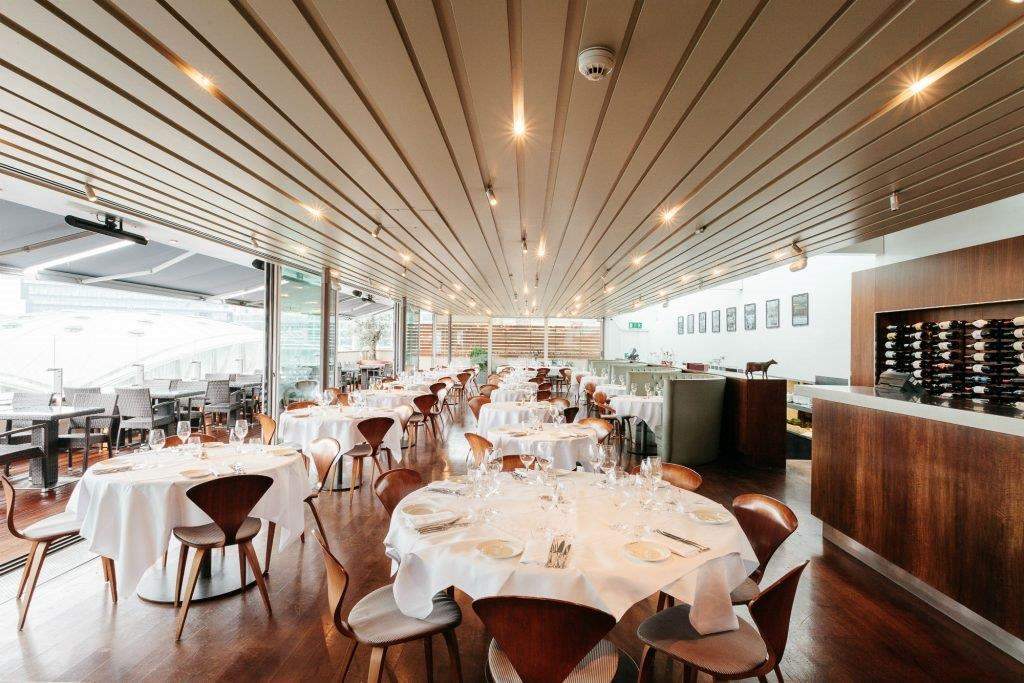
Smiths of Smithfield is not just the best steak in town — it’s an all-round class act, writes Christopher Jackson
Smiths of Smithfield is situated appropriately near the city’s market, where meat has been traded for 800 years. It’s a many-tiered listed building in Farringdon – that doomed place of transit – and the top floor is something you have to fight for: it is only accessed by braving a ground floor of slightly alarming music and a louche, velvet-cushioned elevator.
But the lift rises through the floors, like a rapid promotion, until you are in London’s skies, keeping company with the dome of St Paul’s, and the apparently never-to-be-completed Shard. Up here, where Boris Johnson’s cranes remind you of his hyperactive mayoral tenure, summer light floods into an intimate space, comprising around fifteen tables. It is one of those places which communicates a certain airy privilege: this was election night, and it was possible to think of the mess of the democratic moment taking place in some remote underneath far from this thoughtful place of wine and steak.
Smiths was, of course, once owned by John Torode, the co-presenter of Masterchef, famous for talking at Gregg Wallace in a voice so loud it could shatter the Shard in its entirety. But tonight Torode was not in evidence, which was an aural blessing, and we were instead served by the soft-spoken but essentially theatrical sommelier Raphael, who began proceedings with the meticulously moral gesture of a glass of Charles Heidsieck champagne.
In a place so famous for its steak, it was surprising to find oneself immediately confronted with first-rate sea food, in the shape of Colchester rock oysters, pickled cucumber, horseradish, green chili, and lime. Woody Allen once joked: ‘I will not eat oysters. I want my food dead. Not sick. Not wounded. Dead.’ But these had the right kind of life: the oysters were fresh, and accompanied by lively citrus boules. This mouthful of benign ocean was accompanied by a Domaine Laguilhon, 2013 – an exercise in elderflower and peach, a sort of liquid Cézanne.
The other starter – the scorched mackerel – was served with an arguably worrying blob of watercress mayo, rhubarb, and monks beard. The blob raised various unnamed fears in my companion, who became visibly tense. But an impressive exhibition of courage ensued on his part, and the blob itself resolved all doubts: it was the best thing on the plate, a mustardy glue that delivered tang and acidity to balance a fish which might otherwise have been too oily. It came with a 2015 Vesevo Falanghina from Beneventoano: this was like a Sauternes but without the sweetness.
But soon, all present had to concede that we had come here primarily for the meat. With sudden justice, two steaks appeared – one a sirloin from Cornwall, the other a rump from Maren meats in London. UK-sourced, dry aged, and accompanied by creamed spinach and heritage tomatoes, I doubt you will find steaks outside Texas of greater quality. At this point Torode would have seemed the retiring type next to our vocal approval.
The sommelier Raphael continued to exhibit his gift of useful prophecy: he was able to predict our wishes and enact them in wine. Various images present themselves in memory of his jangling approach to our table, as he brought drinks with the same clinking swagger that waiters set up empty glasses at a meal’s beginning.
By now the prime minister had lost her majority, but we were aloof from these developments – creatures of pleasure who couldn’t seriously be subjected to the whims of the DUP in the next parliament, or indeed in any other. Besides, if a soft Brexit was now in the offing, perhaps these wines would pour themselves over into the UK unminding of any humourless border-tariff. Certainly, the high altitude Malbec, grown on the terraces of Mendoza, was an ideal match for the sirloin. After that, we viciously toasted the possible demise of Amber Rudd with a slope of Argentina – the aromatic height of a late harvest Semillon from Valentin Bianchi.
The evening kept accumulating wonders. Beyond us, the results kept coming in. Our deserts evaporated amid confident political predictions which would prove outmoded the following morning. Eventually, Raphael produced a spate of Valdespinos with the air of a skilled magician. We drank them. And each was a liquidised fig, consumed tearfully as a toast to the career of Nicholas William Peter Clegg.
Christopher Jackson is head of the Spear’s Research Unit










